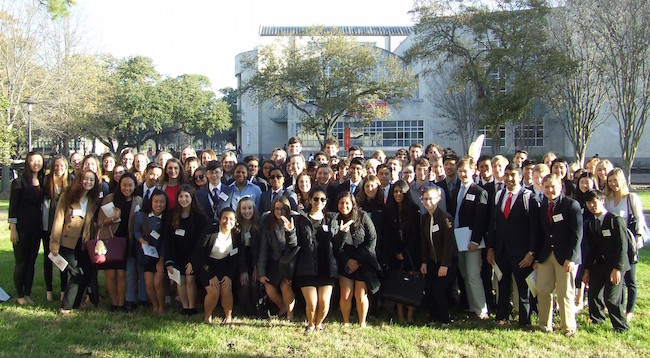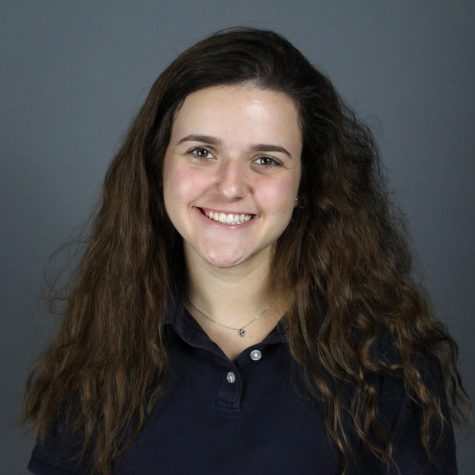Day in the Life: Model United Nations goes to University of Houston
85 SJS students went to UH for the forty-third annual Houston Area Model United Nations.
February 6, 2018
On Jan. 25-26, 85 SJS students travelled to the University of Houston campus for the 43rd annual Houston Area Model United Nations conference. The Model UN Club is led by seniors Sukul Mittal and Henry Philpott and is sponsored by history teacher Wendall Zartman; the chaperones were Barbara DiPaolo, John Ciarleglio, Ned Mulligan and Suzanne Webb. The conference aims to simulate the real United Nations by engaging students in discussions regarding global affairs and relations. Students from SJS were given a choice of 11 countries to represent, from Algeria to Tuvalu. Then, each student chose a UN committee to join, such as the Economic and Social Council and the United Nations Environment Programme. For two days, students spent their time in committee sessions with delegates from other Houston-area schools, with each delegate representing a different country. In committee, delegates discussed one or two issues pertaining to the purpose of the committee and wrote and proposed resolutions. This year, most committees also experienced a “crisis,” during which an unexpected event occured and delegates had to come up with the best solution to the problem. Shani Israel, a junior delegate representing Mexico, discusses her second Model UN experience.
Thursday
6:30 a.m.: I wake up dreading another typical school day. After about ten minutes in bed, I realize that I am instead attending Model UN and need to leave the house in just twenty minutes. I jump out of bed and get ready.
7:15 a.m.: I arrive at my friend’s house late after rushing to boil water to defrost my car’s windshield.
7:35 a.m.: We start panicking because there is heavy traffic, and we are already five minutes late. I start to doubt that we can make it by 7:45 when the bus leaves.
7:43 a.m.: We arrive at Caven, and to our surprise, the buses are still parked in the lot. The bus promptly leaves to the University of Houston campus.
9:00 a.m.: Opening ceremonies begin. I am amazed at the number of people participating in this event (nearly 1200, specifically). Former Houston mayor Annise Parker speaks about politics and inspires participants to get involved.
10:15 a.m.: We split up into our committees. I am glad that this year I signed up for the same committee, General Assembly, as some of my friends. Because my committee last year, ECOSOC, had around 30 people, I am intimidated by the 80 other participants in the room. Everyone is so formal and prepared.
12:30 p.m.: Three-and-a-half hours later, we still have not come up with a topic to discuss. The group was deciding between three topics, and because the group is evenly split regarding the topics, there is no majority ruling. I am just happy to be released for lunch.
1:20 p.m.: I finally get my meal from The Waffle Bus food truck. Waiting 50 minutes in line would not have been so frustrating if other students didn’t constantly cut the line in front of me.
1:30 p.m.: Session reopens. Everyone is tired of debating which topic to discuss, and we soon have a topic: education. The next three hours consists of people repeating a variation of “The delegate of [insert country here] truly believes that education is necessary in developing countries.”
4:30 p.m.: Dinnertime. My friends and I give up on the never-ending food truck lines and settle for ice cream, which is way better than the food trucks, anyway. The sugar energizes me from the exhausting (but fun) day.
5:30 p.m.: I receive notes from the delegate of Russia asking me to wage war on the United States with the help of North Korea. I accept the offer. A few minutes later, I get a letter from the United States asking me not to listen to Russia since the US never “did anything wrong.”
6:30 p.m.: The group has written four resolutions to help relieve the issue of education, including abolishing the SAT, creating community centers in developing countries, incentivizing students to learn with food and establishing new forms of security in wartorn countries where seeking an education is dangerous. During the unmoderated caucuses, my friends and I discuss all of the unnoticed loopholes in these resolutions.
7:30 p.m.: I look up at the clock, expecting it to read 5:30. Time flew by, and I am sad to leave. We take awhile to return to school, and I still need to drive my friend home.
9:15 p.m.: I get back home. I take a “quick break” from my hectic day on my bed and don’t wake up again.
Friday
6:30 a.m.: I panic because I never heard an alarm sound. I, for once, am grateful for waking up early every morning and not being able to sleep past 6:30 anymore.
7:15 a.m.: My friend picks me up.
7:45 a.m.: We arrive at Avalon Diner. We enjoy their omelettes and even see some SJS students.
8:30 a.m.: We get to school… on time. I am excited for a new day at Model UN.
9:00 a.m.: Arriving at the campus right on time, we rush into the meeting room and begin. It only takes us about 30 minutes to vote on three out of our four resolutions. Our moderator informs us that we do not have time to start a new topic, so we just talk among ourselves.
10:00 a.m.: For the next two hours we have moderated caucuses to discuss who should be nuked and which delegates do not represent real countries. In the end, about ten delegates’ countries are destroyed.
11:45 a.m.: Dismissal for lunch. My friends and I started a competition for better eating habits, so we all decide to eat salad.
12:45 p.m.: We return to our committee room and decide to start a crisis.
1:00 p.m.: The crisis begins. North Korea’s leader Kim Jong-un has died, and the delegate of “Just” Korea has taken over as Kim Jong-dos. The first thing he does as ruler is declare war on America, and the committee splits up into two sides.
2:00 p.m.: After a heated discussion, we start superlatives and give awards to delegates such as “Best Voice” and “Most Likely to be a Serial Killer.”
3:00 p.m.: We head over to closing ceremonies.
3:45 p.m.: Closing ceremonies actually start. Though SJS did not win any awards at first, we were excited to see classmates win three awards. We then left early because of games against Episcopal.
5:40 p.m.: We reach school, and my friend drives me from Caven to the gym because I am volunteering at the concessions stand. Model UN students, who were earlier in their business attire and discussing important issues, were now dressed in pajamas and chanting on the stands. Back to our normal life.





